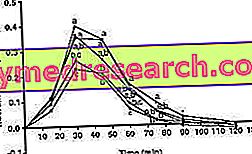
Information on 100% Whey Pro - Scitec Nutrition
100% WHEY PRO - SCITEC NUTRITION
Food supplement of whey protein concentrate and ultrafiltered
FORMAT
Pack of 900gr, 2350 gr and 5000 gr various tastes.
COMPOSITION
Concentrated and ultra-filtered whey protein containing: lactoglobulin, lactoferrin, lactalbumin, immunoglobulin protein fraction, L-glutamine, flavor and color mixture, Aspartame
Media Analysis (Gusto Cacao) | For 100 g | Per daily dose (12.5 g) |
Energy value | 384 Kcal / 1605 Kj | 48 Kcal / 200.6 Kj |
Protein | 76 g | 9.5 g |
Carbohydrates | 5.6 g | 0.7 g |
Grassi | 8 g | 1 g |
Sodium | 0.1 g | 0 g |
Potassium | 0.4 g | 0.1 g |
Amino acid profile | For 100 g | Per daily dose (12.5 g) |
L-Alanine | 3528 mg | 441 mg |
L-Arginine | 1692 mg | 211.5 mg |
L-aspartic acid | 8672 mg | 1084 mg |
L-cysteine + L-methionine | 3160 mg | 395 mg |
L-glutamine | 13792 mg | 1724 mg |
L-glycine | 1468 mg | 183.5 mg |
L-histidine | 1544 mg | 193 mg |
L-isoleucine | 4996 mg | 624.5 mg |
L-Leucine | 7716 mg | 964.5 mg |
L-Lysine | 7276 mg | 909.5 mg |
L-Phenylalanine + L-Tyrosine | 4996 mg | 624.5 mg |
L-proline | 4924 mg | 615.5 mg |
L-serine | 4484 mg | 560.5 mg |
L-threonine | 5732 mg | 716.5 mg |
L-Tryptophan | 1324 mg | 165.5 mg |
L-valine | 4996 mg | 624.5 mg |
Product features 100% Whey Pro - Scitec Nutrition
The proteins in question were obtained through processes of concentration and ultrafiltration of whey. During the production process, the whey is conveyed through a high-pressure circuit to gradually lower porosity filters, which reduce the presence of any residues, guaranteeing a good quality / price ratio. Generally the products obtained in this way have a protein concentration of between 70 and 80% and a fat content of between 4 and 6%. An important evaluation parameter, which allows to evaluate the quality of the product, is the sodium content, which should never exceed 200 mg per 100 g of product, even if its indication on the label is not mandatory.
Whey Protein - with the term whey pro, whey proteins are generally indicated obtained through different processes of extraction and purification, distinguishing them from milk proteins particularly rich in caseins. The different amino acid profile and the different structural complexity between whey proteins and milk proteins, strongly influences both the pharmacokinetic properties and the functional characteristics, guaranteeing different applications. More precisely, several studies have shown that the whey absorption kinetics is much faster than other proteins, guaranteeing an amino acid plasma peak as early as 30 minutes after ingestion; this result is essentially due to the selection of easily digestible proteins and peptides, which can be absorbed by the intestinal wall through specific transporters known as PEPT. The rapid digestion time and the high availability of amino acids following their intake make whey proteins particularly indicated in the post-work-out phase, because they are ideal in promoting the recovery process. The induction of the anabolic process is one of the most sought after effects by sportsmen and most characterized by the scientific world; this stimulus appears to be associated with different molecular and metabolic pathways, including:
- Substrate presence: the presence of free amino acids is necessary to start the protein synthesis process;
- Molecular action: it seems to be mainly linked to some amino acids, such as BCAAs, and more specifically to leucine and its metabolites. It has been noted, both in vitro and in vivo, how this amino acid can induce the activation of some transcription factors, such as mTor, necessary to direct anabolism towards protein synthesis and to modulate the activity of the Akt pathway also promoting the muscle glycogen resynthesis. All these actions seem instead inhibited in the case of hypoproteic diets, where the protein share falls below half a gram per kilo of body weight.
- Hormonal action: as far as we can tell, the secretagogue action on beta cells by proteins is now known and unanimously recognized by the scientific world.

Although hypertrophy is the main objective sought by those who take supplements of this type, the literature has also sought to clarify other possible ergogenic capacities of whey proteins.
Although still discussed by experts in the field and less characterized than the previous characteristic, for which there also seems to be a clear molecular basis, it is also possible to list other whey protein activities:
- Ergogenic role: several studies seem to agree on the ability of proteins to provide a greater energy boost to the athlete who uses them. In reality the best results were obtained by designing pre-race or pre-workout balanced snacks that also contained a significant share of carbohydrates.
- Protective role: still much discussed, it is partly justified by the protective action of some amino acids on muscle metabolism. More precisely, pre-race administration should be able to save muscle proteins from catabolism and the related amino acids from oxidation. This property, observed only in some studies and denied by others, would affect the levels of creatine kinase and lactic dehydrogenase, two important markers of muscle damage.
- Immunostimular role: recent evidence seems to suggest a protective role towards the immune system. Rather evident in particular pathological conditions and in conditions of generalized stress, the strengthening of the immune system could be correlated on the one hand to the strengthening of the body's antioxidant capacity. and on the other hand to an inducing action by some amino acids like glutamine.
Recommended use by the company - 100% Whey Pro - Scitec Nutrition
Take ½ scoop equal to 12.5 grams per day between meals, dissolved in your favorite beverage.
Use in sports 100% Whey Pro - Scitec Nutrition
Very interesting is the re-reading of the scientific articles related to the timing and dosage of protein supplements. Naturally, it must first be specified that it is not possible to define a recommended dosage valid for everyone, as this should be calculated and adapted to the athlete's dietary, nutritional and physiological needs. In order for the supplementary protocol with proteins to guarantee appreciable results, it is in fact very important that it be perfectly coordinated with the daily dietary protein intake, which must be programmed on the basis of body weight and the type of physical activity performed.
Once this criterion has been defined, the protein powder supplement can be used to optimize the timing of intake and reduce the problems associated with an excess of protein foods.
Most protocols define optimal - for recovery and to stimulate muscle growth - the use of whey protein intake in the immediate post-work-out, with a ratio of 1 to 3 with carbohydrates. As is known, in fact, the protein / CHO synergy is particularly important in restoring previously depleted glycogen reserves and in facilitating protein synthesis.
However, there are other protocols that obtain an important result in terms of hypertrophy, dividing the protein quota into several assumptions at regular time intervals.
In both cases the intake is suggested on an empty stomach.
According to various studies, supplementation should last for at least 8 weeks to obtain appreciable results.
Synergy - 100% Whey Pro - Scitec Nutrition
Proteins + antioxidants: the combination of antioxidants seems to enhance the protective effect of proteins during intense physical activity.
Protein + CHO: seems to be the most effective combination ever. In the pre-race, properly combined and choosing the most suitable source, carbohydrates can sustain the performance and improve the energy properties of the muscle; in post-work out, on the other hand, they can optimize the recovery and growth process.
Protein + Creatine: always combined with carbohydrates, taken in the post work out, they seem to improve the increase in lean mass, even if not all the studies agree.
Side Effects 100% Whey Pro - Scitec Nutrition
Known are the long-term side effects of a diet too rich in proteins or amino acids; renal damage, dehydration induced by increased urinary secretion, hepatic or renal distress, lipidemic alterations and related associated pathologies, tissue acidosis and bone demineralization, are just some of the consequences of an unbalanced diet over time. Among the harmful effects derived from a diet too rich in proteins, there is certainly also the increase of adipose tissue induced by the complex metabolic crossroads responsible for the energy-functional coordination of the organism.
Precautions for use 100% Whey Pro - Scitec Nutrition
The product is contraindicated in cases of renal or hepatic disease, cardiovascular disease and / or hypertension, allergies and autoimmune diseases, during pregnancy, during breastfeeding, under 12 years and for adolescents not yet trained.
In the event of prolonged use (over 6/8 weeks), medical advice is required.
This article, elaborated on the critical re-reading of scientific articles, university texts and common practice, is for informational purposes only and is therefore not a medical prescription. It is therefore always necessary to consult your doctor, nutritionist or pharmacist before starting to use any kind of supplement . More information on the critical analysis of 100% Whey Pro - Scitec Nutrition.
| BIBLIOGRAPHY |
Int J Sport Nutr Exerc Metab. 2004 Jun; 14 (3): 255-71. Effect of an amino acid, protein, and carbohydrate mixture on net muscle protein balance after resistance exercise.Borsheim E, Aarsland A, Wolfe RR. Prosthetic synthesis levels increase and associate post-workout protein with CHO. Diabetes Metab Res Rev. 2007 Jul; 23 (5): 378-85. Slow versus fast proteins in the stimulation of beta-cell response and activation of the entero-insular axis in type 2 diabetes.Tessari P, Kiwanuka E, Cristini M, Zaramella M, Enslen M, Zurlo C, Garcia-Rodenas C. Effects of a combined essential amino acids / carbohydrate supplementation on muscle mass, architecture and maximal strength following heavy-load training. Vieillevoye S, Poortmans JR, Duchateau J, Carpentier A. Eur J Appl Physiol. 2010 Jun 3. [Epub ahead of print] Effects of whey protein isolated on body composition, lipids, insulin and glucose in overweight and obese individuals. Pal S, Ellis V, Dhaliwal S. Br J Nutr. 2010 Apr 9: 1-8. [Epub ahead of print] Effect of protein / essential amino acids and resistance training on skeletal muscle hypertrophy: A case for whey protein. Hulmi JJ, Lockwood CM, Stout JR. Nutr Metab (Lond). 2010 Jun 17; 7 (1): 51. [Epub ahead of print] Timing protein intake increases energy expenditure 24 h after resistance training. Hackney KJ, Bruenger AJ, Lemmer JT. Med Sci Sports Exerc. 2010 May; 42 (5): 998-1003. Post-exercise carbohydrate plus whey protein hydrolysates supplementation increases skeletal muscle glycogen level in rats. Morifuji M, Kanda A, Koga J, Kawanaka K, Higuchi M. Amino Acids. 2010 Apr; 38 (4): 1109-15. Epub 2009 Jul 11. The effects of creatine and whey protein supplementation on body composition in men aged 48 to 72 years during resistance training. Eliot KA, Knehans AW, Bemben DA, Witten MS, Carter J, Bemben MG. J Nutr Health Aging. 2008 Mar; 12 (3): 208-12. Supplementation with a whey protein hydrolysate enhances recovery of muscle force-generating capacity following eccentric exercise. Buckley JD, Thomson RL, Coates AM, Howe PR, DeNichilo MO, Rowney MK. J Sci Med Sport. 2010 Jan; 13 (1): 178-81. Epub 2008 Sep 2 .. Effect of protein ingestion on energy expenditure and substrate utilization after exercise in middle-aged women. Benton MJ, Swan PD. Int J Sport Nutr Exerc Metab. 2007 Dec; 17 (6): 544-55. Impact of differing protein sources and a creatine containing nutritional formula after 12 weeks of resistance training. Kerksick CM, Rasmussen C, Lancaster S, Starks M, Smith P, Melton C, Greenwood M, Almada A, Kreider R. Nutrition. 2007 Sep; 23 (9): 647-56. Effects of resistance training and protein supplementation on bone turnover in young adult women. Mullins NM, Sinning WE. Nutr Metab (Lond). 2005 Aug 17; 2: 19. J Trop Pediatr. 2006 Feb; 52 (1): 34-8. Epub 2005 Jul 13. Features of whey protein concentrated supplementation in children with rapidly progressive HIV infection.Moreno YF, Sgarbieri VC, da Silva MN, Toro AA, Vilela MM. Milk whey protein decreases oxygen free radical production in a murine model of chronic iron-overload cardiomyopathy. Bartfay WJ, Davis MT, Medves JM, Lugowski S. Can J Cardiol. 2003 Sep; 19 (10): 1163-8. Effects of leucine and whey protein supplementation during eight weeks of unilateral resistance training. Coburn JW, Housh DJ, Housh TJ, Malek MH, Beck TW, Cramer JT, Johnson GO, Donlin PE. J Strength Cond Res. 2006 May; 20 (2): 284-91. Systemic indices of skeletal muscle damage and recovery of muscle function after exercise: effect of combined carbohydrate-protein ingestion. Betts JA, Toone RJ, Stokes KA, Thompson D. Appl Physiol Nutr Metab. 2009 Aug; 34 (4): 773-84. nt J Sport Nutr Exerc Metab. 2009 Feb; 19 (1): 79-96. Conjugated linoleic acid combined with creatine monohydrate and whey protein supplementation during strength training.Cornish SM, Candow DG, Jantz NT, Chilibeck PD, Little JP, Forbes S, Abeysekara S, Zello GA. College of Kinesiology, University of Saskatchewan, Saskatoon, SK, Canada. utr Res. 2008 Oct; 28 (10): 651-8. Whey protein ingestion in elderly persons results in greater muscle protein than ingestion of its constituent essential amino acid content.Katsanos CS, Chinkes DL, Paddon-Jones D, Zhang XJ, Aarsland A, Wolfe RR. Ingestion of whey hydrolysate, casein, or soy protein isolate: effects on mixed muscle protein synthesis at rest and following resistance exercise in young men. Tang JE, Moore DR, Kujbida GW, Tarnopolsky MA, Phillips SM. J Appl Physiol. 2009 Sep; 107 (3): 987-92. Epub 2009 Jul 9. The effect of bovine whey protein on ectopic bone formation in young growing rats. Kelly O, Cusack S, Cashman KD. Br J Nutr. 2003 Sep; 90 (3): 557-64. Bovine colostrum supplementation during endurance running training improves recovery, but not performance. Buckley JD, Abbott MJ, Brinkworth GD, Whyte PB. J Sci Med Sport. 2002 Jun; 5 (2): 65-79. Effect of bovine colostrum on anaerobic exercise performance and plasma insulin-like growth factor I. Buckley JD, Brinkworth GD, Abbott MJ. J Sports Sci. 2003 Jul; 21 (7): 577-88. |




